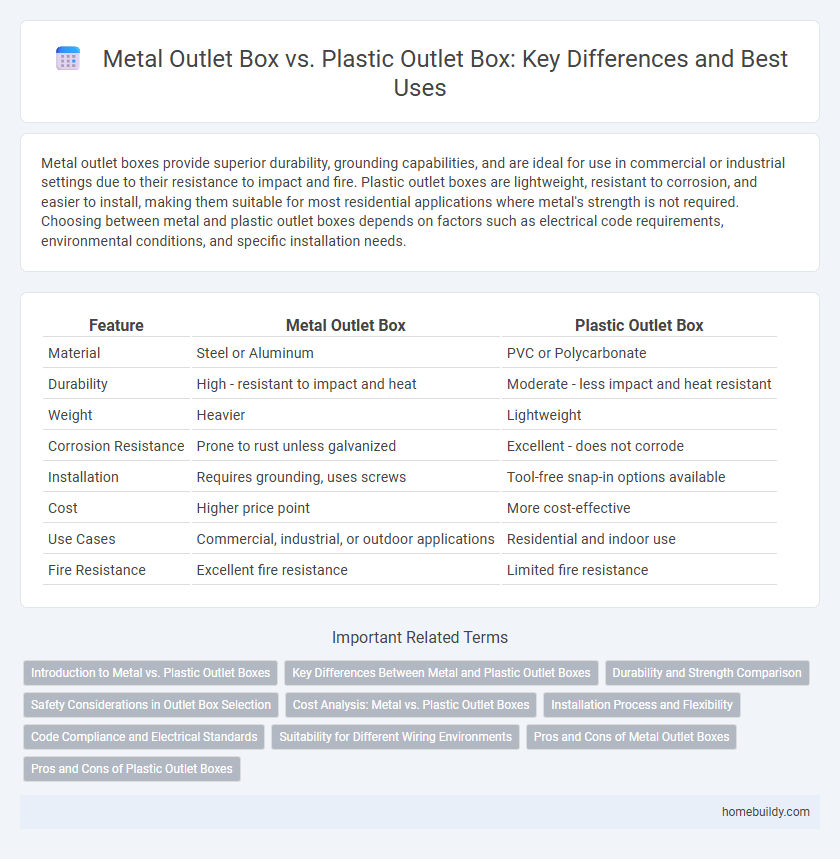Metal outlet boxes provide superior durability, grounding capabilities, and are ideal for use in commercial or industrial settings due to their resistance to impact and fire. Plastic outlet boxes are lightweight, resistant to corrosion, and easier to install, making them suitable for most residential applications where metal's strength is not required. Choosing between metal and plastic outlet boxes depends on factors such as electrical code requirements, environmental conditions, and specific installation needs.
Table of Comparison
| Feature | Metal Outlet Box | Plastic Outlet Box |
|---|---|---|
| Material | Steel or Aluminum | PVC or Polycarbonate |
| Durability | High - resistant to impact and heat | Moderate - less impact and heat resistant |
| Weight | Heavier | Lightweight |
| Corrosion Resistance | Prone to rust unless galvanized | Excellent - does not corrode |
| Installation | Requires grounding, uses screws | Tool-free snap-in options available |
| Cost | Higher price point | More cost-effective |
| Use Cases | Commercial, industrial, or outdoor applications | Residential and indoor use |
| Fire Resistance | Excellent fire resistance | Limited fire resistance |
Introduction to Metal vs. Plastic Outlet Boxes
Metal outlet boxes offer superior durability, grounding capabilities, and fire resistance compared to plastic outlet boxes, making them ideal for commercial and industrial electrical installations. Plastic outlet boxes, while lightweight and corrosion-resistant, lack the robust grounding features of metal boxes but are often preferred in residential settings due to ease of installation and cost-effectiveness. Understanding the material properties and application requirements is essential for selecting the appropriate outlet box type for safety and compliance with electrical codes.
Key Differences Between Metal and Plastic Outlet Boxes
Metal outlet boxes offer superior durability, grounding capabilities, and fire resistance compared to plastic outlet boxes, which are lightweight and easier to install. Plastic boxes are non-conductive, reducing electrical shock risks, but lack the robustness and grounding features intrinsic to metal boxes. Metal outlet boxes are preferred in commercial and industrial settings, while plastic boxes are commonly used in residential environments.
Durability and Strength Comparison
Metal outlet boxes provide superior durability and strength due to their rigid construction and resistance to impact, making them ideal for commercial or industrial environments. Plastic outlet boxes, while lighter and corrosion-resistant, are more prone to cracking under stress or impact, limiting their use to lighter-duty residential applications. Metal boxes also offer better grounding capabilities, enhancing overall electrical safety and reliability.
Safety Considerations in Outlet Box Selection
Metal outlet boxes offer superior grounding capabilities, reducing the risk of electrical shock in installation environments. Plastic outlet boxes are non-conductive, which minimizes corrosion and eliminates grounding requirements but may be less durable under physical stress. Selecting the appropriate outlet box depends on factors like grounding needs, environmental exposure, and compliance with electrical codes for safety.
Cost Analysis: Metal vs. Plastic Outlet Boxes
Metal outlet boxes generally cost more than plastic outlet boxes due to the higher price of raw materials and manufacturing processes involved in producing steel or aluminum components. Plastic outlet boxes offer a more budget-friendly option, often priced 30-50% lower than their metal counterparts, making them ideal for residential projects where cost savings are a priority. While metal boxes provide superior durability and grounding capabilities, the initial investment is significantly higher, influencing overall project budgets in electrical installations.
Installation Process and Flexibility
Metal outlet boxes require grounding and often involve more intricate wiring due to their conductive properties, making installation slightly more labor-intensive but ensuring robust durability and fire resistance. Plastic outlet boxes are easier to install with built-in clamps and screw points, offering greater flexibility for modifications and less risk of electrical shorts since they are non-conductive. Both types support standard wiring sizes, but plastic boxes allow faster adjustments during installation, while metal boxes better withstand physical damage and heat.
Code Compliance and Electrical Standards
Metal outlet boxes offer superior grounding capabilities mandated by the National Electrical Code (NEC), ensuring enhanced safety and code compliance in commercial and industrial installations. Plastic outlet boxes must be used with appropriate grounding methods and are typically favored in residential settings for corrosion resistance, but they require adherence to UL-listed standards to meet electrical safety codes. Both types must comply with NEC Section 314, which outlines requirements for box volume, securing, and support to prevent hazards and maintain certification.
Suitability for Different Wiring Environments
Metal outlet boxes are ideal for environments requiring enhanced durability and grounding, especially in commercial or industrial settings with metal conduit wiring. Plastic outlet boxes suit residential and light-duty applications, offering corrosion resistance and ease of installation with non-metallic sheathed cables. Choosing between metal and plastic depends on factors like electrical code requirements, environmental exposure, and the type of wiring system used.
Pros and Cons of Metal Outlet Boxes
Metal outlet boxes offer superior durability and fire resistance, making them ideal for industrial and commercial applications where safety is a priority. They provide excellent grounding capabilities and can withstand physical impacts better than plastic boxes, but they are heavier and prone to corrosion if not properly coated. Installation may require more tools and expertise due to their rigid structure and potential difficulty in bending conduits.
Pros and Cons of Plastic Outlet Boxes
Plastic outlet boxes offer excellent resistance to corrosion and moisture, making them ideal for damp or outdoor environments. They are lightweight and easier to cut or modify during installation, yet they lack the durability and impact resistance of metal boxes, which can be a drawback in high-traffic or industrial areas. Compared to metal outlet boxes, plastic options provide electrical insulation, reducing the risk of short circuits but may not offer the same grounding capabilities essential for certain electrical codes.
Metal outlet box vs Plastic outlet box Infographic

 homebuildy.com
homebuildy.com